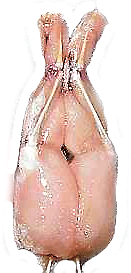|
|
|
||||||||||
|
|
Bull frogs and the common frog come from the South and the spring or grass frogs come from the Atlantic coast and the Mississippi River tributaries. Method of Production: The frog's legs are removed either at or below the pelvis after harvesting. Product that contains flesh above the pelvis is termed "saddle-on". This is less preferable than the "saddle-off" product because of a lower yield to the foodservice operator. Saddle-on frog legs also lose a size in trimming. All frog legs, whether saddle-on or -off, are skinless. Market Form
Fresh, Frozen Seasonality: Typically, production of both wild and farmed product peaks in the rainy months from April to October. Wild product are sometimes protected during these times because frogs are a natural predator of mosquitoes. Sizing: Grading is done by the number of leg pairs per lb. Sizes range from a high of 2/4 ct to a low of 16/20 ct. The most popular sizes are 4/6 and 6/8 ct. Application: Frog legs have a mild flavor and are delicious fried or sauteed
|
||||||||||
|
|
|||||||||||

